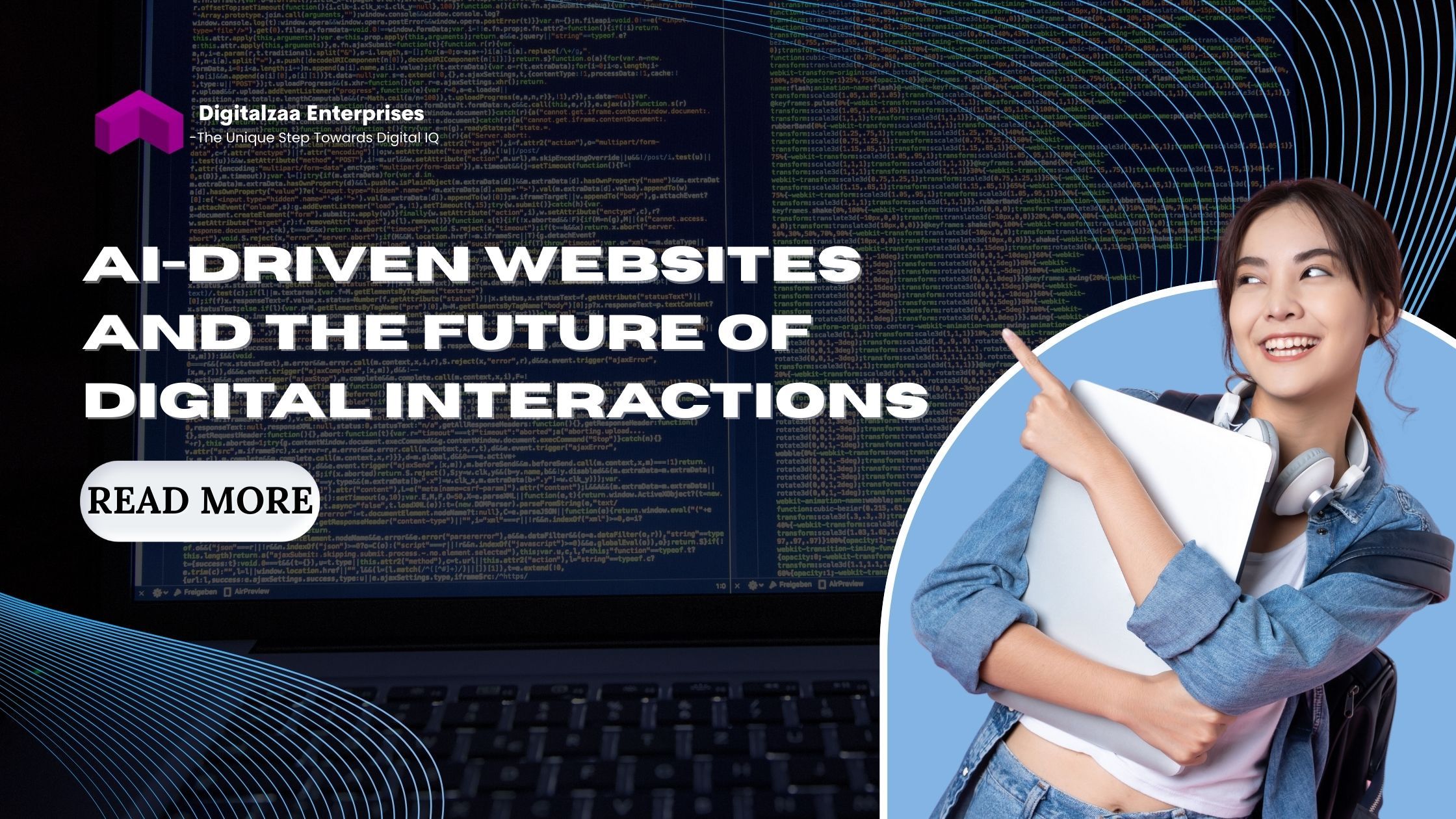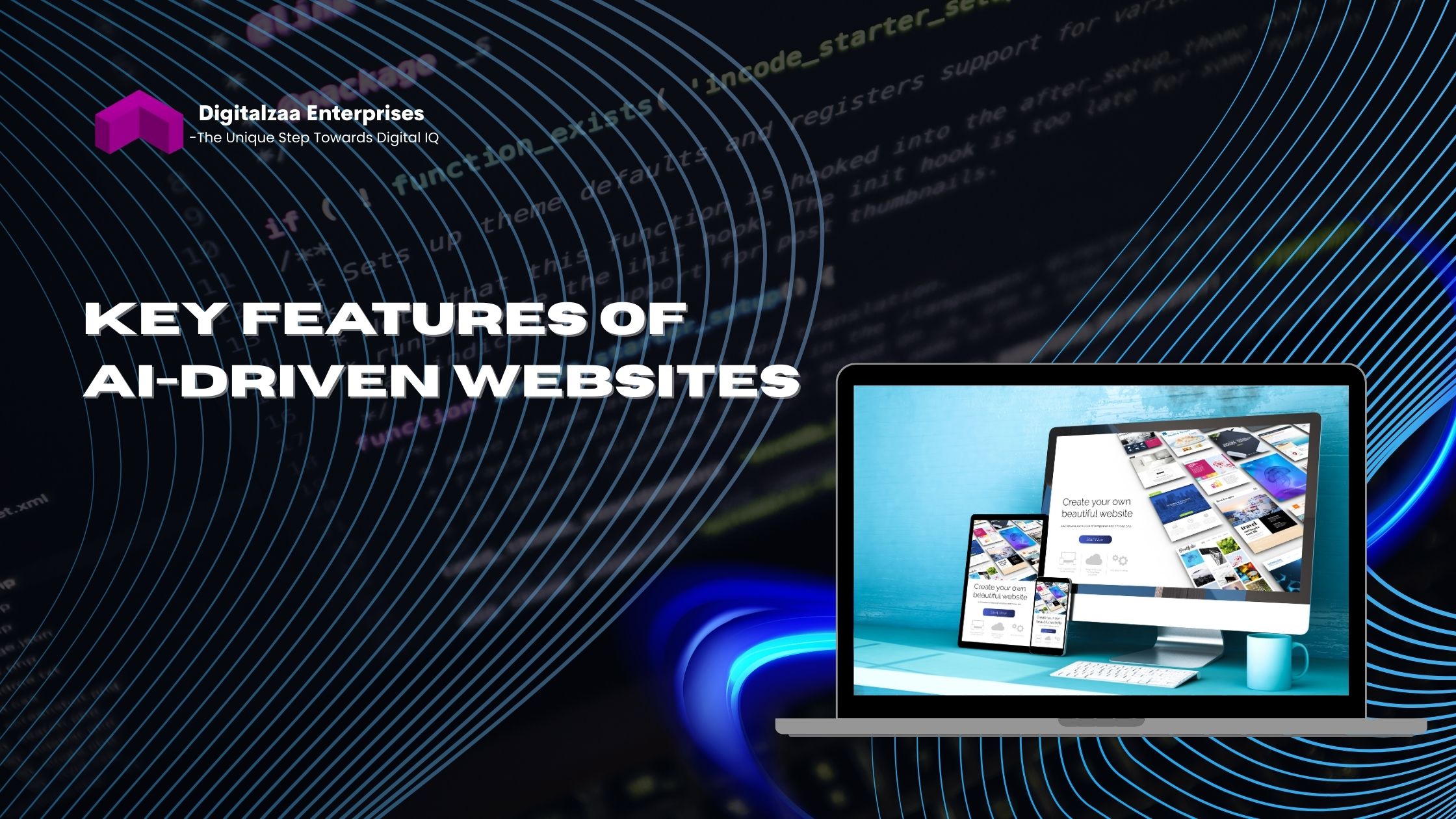AI-Driven Websites and the Future of Digital Interactions.

In the past decade, the internet has transformed from static web pages to highly interactive platforms that cater to billions of users every day. Businesses, organizations, and individuals rely on websites as the foundation of their digital presence. However, as technology advances, the traditional concept of a website is undergoing a massive shift. Artificial Intelligence (AI) is at the center of this evolution, transforming websites from static or even dynamic platforms into intelligent, adaptive ecosystems.
AI-driven websites are not just a trend—they are the future of digital interactions. These websites integrate machine learning, natural language processing (NLP), computer vision, and predictive analytics to create experiences that are personalized, responsive, and intuitive. From chatbots and recommendation engines to AI-powered design and automated customer service, the role of AI in shaping digital interactions is only beginning to unfold.
In this blog, we will explore what AI-driven websites are, their key features, the benefits they bring, real-world applications, and how they will redefine the future of digital experiences.
What Are AI-Driven Websites?
AI-driven websites are platforms that leverage artificial intelligence technologies to provide enhanced interactivity, automation, personalization, and predictive capabilities. Unlike traditional websites, which rely on pre-programmed responses and static user journeys, AI-driven websites evolve continuously based on data.
For example, an AI-driven e-commerce website can analyze user behavior in real-time, predict what products a customer might be interested in, and provide personalized product recommendations instantly. Similarly, AI-driven corporate websites can use conversational AI to answer questions, book appointments, and even resolve support tickets without human intervention.
Essentially, these websites transform from being passive information hubs into active digital assistants.
Key Features of AI-Driven Websites

To better understand their impact, let’s look at some defining features of AI-driven websites:
- Personalization at Scale: AI allows websites to adapt in real-time to each visitor. Instead of a generic homepage, users see content, recommendations, or services tailored to their preferences, location, or browsing history. This is powered by algorithms that analyze data such as previous visits, clicks, or purchase patterns.
- Conversational Interfaces: Chatbots and virtual assistants powered by NLP enable seamless interactions. Users no longer have to search through FAQs; instead, they can simply ask questions in natural language and get instant, relevant answers.
- Predictive Analytics: By analyzing user data, AI can predict future actions. For instance, an AI-driven website for a travel agency can anticipate when a user might be interested in booking a trip and offer timely deals.
- Automated Design and Development: AI-driven platforms like Wix ADI (Artificial Design Intelligence) or Bookmark leverage algorithms to design websites based on user preferences. They select layouts, colors, and elements that fit the business, making web creation faster and more efficient.
- Enhanced Security: AI can monitor unusual activities in real-time, detect fraud, and safeguard sensitive data by adapting to new threats faster than human-administered systems.
- Voice and Visual Search: Websites integrated with AI support advanced search capabilities. Users can upload an image to find similar products (visual search) or use voice commands to navigate and shop.
- Content Generation: AI tools can automatically generate blogs, product descriptions, or FAQs, ensuring that websites remain updated and relevant without the constant need for manual input.
Benefits of AI-Driven Websites
The integration of AI into websites goes beyond technological novelty—it directly impacts businesses, users, and the overall digital ecosystem.
1. Superior User Experience: Personalized journeys and intuitive interactions make users feel valued, encouraging longer visits and higher engagement rates.
2. Increased Conversion Rates: By delivering the right content or recommendation at the right time, AI can significantly boost conversions in e-commerce, subscription models, and service industries.
3. Cost Efficiency: Automating repetitive tasks such as customer support, lead generation, or content creation reduces operational costs.
4. Scalability: AI-driven websites can handle thousands of interactions simultaneously, something that would be impossible for a human-only team.
5. Data-Driven Decisions: AI enables businesses to extract actionable insights from vast amounts of user data, leading to smarter strategies and targeted campaigns.
6. Global Accessibility: With AI-powered translation and localization, websites can cater to international users effortlessly, breaking language barriers and expanding markets.
Applications of AI-Driven Websites

The impact of AI-driven websites can be seen across industries:
- E-Commerce: Platforms like Amazon already use AI extensively for product recommendations, pricing strategies, and chat-based support. Future AI-driven e-commerce sites will act more like personal shopping assistants than digital stores.
- Healthcare: AI-driven healthcare websites provide symptom checkers, appointment scheduling, patient data management, and even personalized treatment recommendations based on user history.
- Finance and Banking: Banks use AI websites to provide real-time fraud detection, personalized investment advice, and conversational assistants for customer support.
- Education: E-learning websites use AI to create adaptive learning paths, where the content adjusts to the learner’s pace and performance.
- Travel and Hospitality: AI-driven travel sites can analyze seasonal data, user preferences, and past behaviors to suggest tailored vacation packages or hotel stays.
- Media and Entertainment: Streaming platforms like Netflix and Spotify already rely heavily on AI for personalized recommendations. This concept is extending to news websites, blogs, and other entertainment portals.
- Real Estate: AI-driven property websites can match buyers with properties based on preferences, predict market trends, and provide immersive virtual tours enhanced by machine learning.
Challenges in AI-Driven Websites
Despite their benefits, AI-driven websites face certain challenges:
- Data Privacy Concerns: Collecting and analyzing user data can raise questions about transparency and security.
- Implementation Costs: Developing and integrating AI solutions can be expensive initially.
- Bias in AI Algorithms: Poorly trained models may produce biased recommendations or responses.
- User Trust: Some users may feel uneasy interacting with AI-driven systems instead of humans.
- Constant Evolution: AI models require regular updates to remain accurate and relevant.
Businesses must address these challenges by prioritizing ethical AI, transparent policies, and user education.
The Future of AI-Driven Websites
The trajectory of AI in digital interactions suggests that websites will transform in profound ways. Here’s what the future might look like:
- Websites as Digital Companions: Instead of browsing static pages, users will interact with websites as if they were speaking to a knowledgeable assistant. Imagine logging into a travel site where the AI says, “Welcome back! Based on your recent searches, here are three destinations you might love this winter.”
- Hyper-Personalization: Future websites will know users better than ever before, using contextual data such as mood, time of day, or even wearable device inputs to shape interactions.
- Seamless Omnichannel Experience: AI will bridge the gap between websites, mobile apps, AR/VR, and physical experiences, creating a unified journey.
- AI-Generated Entire Websites: Not just content but entire websites will be created and updated by AI based on business needs, user trends, and emerging technologies.
- Integration with Web3 and Blockchain: AI-driven websites may integrate with decentralized technologies to ensure transparent, secure, and user-centric experiences.
- Emotionally Intelligent Interactions: Advancements in sentiment analysis will allow websites to respond to users’ emotional states, creating more empathetic and human-like digital interactions.
How Businesses Can Prepare for the Shift
To leverage AI-driven websites effectively, businesses should:
- Invest in Data Strategy – Clean, organized, and secure data is the foundation of AI.
- Start with Scalable AI Solutions – Implement chatbots, recommendation engines, or predictive analytics before expanding.
- Focus on User Trust – Be transparent about data usage and respect privacy.
- Upskill Teams – Train employees to work with AI tools and interpret AI-driven insights.
- Adopt Continuous Optimization – AI thrives on data; continuously update and optimize models for accuracy.
Conclusion
AI-driven websites are reshaping how we interact with the digital world. They offer personalization, automation, predictive capabilities, and intelligent design that traditional websites simply cannot match. While challenges like data privacy and implementation costs exist, the potential benefits far outweigh them.
As AI becomes more sophisticated, websites will evolve from being static destinations into intelligent, interactive platforms that anticipate user needs, offer seamless interactions, and redefine digital engagement. Businesses that embrace this future will not only enhance customer satisfaction but also gain a competitive edge in the rapidly transforming digital economy.


